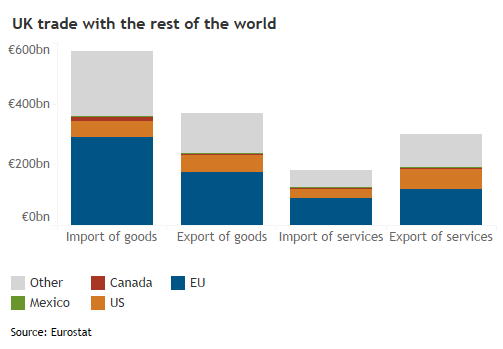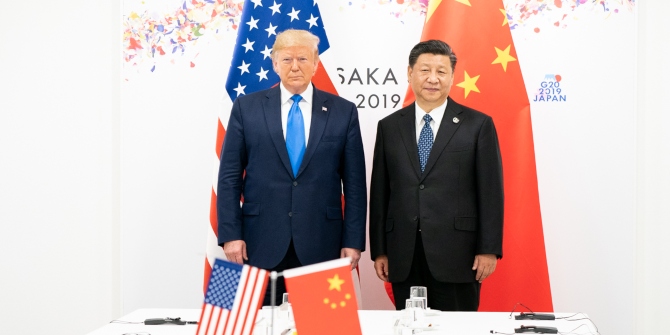
The question of UK membership of NAFTA seems to be doing the rounds again. This is not entirely surprising. Both Australian and Canadian trade officials – including Ottawa’s former chief NAFTA negotiator – have recently called for the UK to join existing trading blocks, such as NAFTA, as an easy fix to potential Brexit-related disruptions to UK trade and production. The idea in itself is not new – back in the early 1990s, some members of Congress in the US hoped to convince London to swap the EU for NAFTA. But, with Article 50 negotiations now under way, there are some in London and Washington who would like to see it seriously considered.
It is not difficult to see why NAFTA might appeal to some on both sides, at least at first sight. It would be a relatively easy and quick way of indirectly concluding a trade deal with the US, and the ‘take it or leave it’ nature of the negotiations, would draw on far less (already scarce) Whitehall resources than negotiating a deal from scratch. With protracted and complex negotiations with Brussels on a divorce settlement, and new trading relationships promising to use up the bulk of London’s limited negotiating capacity for the remainder of the Parliamentary term, a NAFTA membership could also serve as an eye-catching ‘early harvest’ deliverable for the government’s ‘Global Britain’ post-Brexit strategy, ahead of the next general elections.
However, there are a number of issues London would need to consider. First, given the already low tariff levels between the UK and US, the real benefit of a NAFTA membership – like TTIP – would be concentrated on tackling non-tariff and technical barriers via regulatory convergence. As an existing trading block, the onus would be on the UK to align itself with NAFTA’s regulatory and policy frameworks for services and goods, including agriculture SPS, GMOs, product standards, competition policy and IP protection. The high-level of divergence between current EU/UK and NAFTA practice in these areas would make it a highly complex legislative exercise, which would also run against London’s approach to ensuring regulatory stability throughout the UK’s EU exit process.
Figure 1. UK trade with the rest of the world

Second, there are also questions around NAFTA’s compatibility with traditional UK offensive and defensive trade interests. Even after the conclusion of the current planned NAFTA renegotiations, a NAFTA membership is very unlikely to create substantial market opening in areas where the UK’s competitive and comparative advantage is greatest – such as services and financial services – given its relatively low level of coverage in these areas. In contrast, joining NAFTA would be all but certain to expose a range of UK manufacturing and agriculture sectors to highly competitive US and Mexican exports. Importantly, to benefit from preferential market access into NAFTA, UK exporters would, in many cases, have to significantly restructure their production, supply and distribution chains to comply with the North American trading zone’s product standards and rules of origin. In many cases, such as automotive, UK-based firms would have to produce two versions of the same product to export to both EU and NAFTA markets.
Finally, it is important to bear in mind that a UK NAFTA membership could also impact the prospects for a deep and ambitious EU-UK FTA. Both Brussels and London appear to agree that a deal that would minimise potential Brexit-related disruptions to UK and EU supply and distribution chains would be predicated on ensuring overall regulatory convergence between the UK and the single market. This makes the question of NAFTA membership a potentially binary choice for the UK, as well as an issue of sequencing, since its feasibility would ultimately depend on the ambitiousness of the future trading framework the UK agrees with Brussels. This all suggests that the idea of a NAFTA membership for the UK may be already shelved. If it is not, that may, in itself, be interesting.
♣♣♣
- This blog post first appeared at Global Counsel, and was published at LSE Brexit.
- The post gives the views of its author, not the position of LSE Business Review or the London School of Economics.
- Featured image credit: Rainbow Bridge at US Canada border, by Anupam_ts, under a CC-BY-SA-2.0 licence
- Before commenting, please read our Comment Policy.
 Daniel Capparelli is Practice Lead at Global Counsel. He has worked on international trade and financial services policy issues for over a decade with a particular focus on market access and rules frameworks for insurance. He has advised the European Parliament Trade Committee on market access and financial regulation, including on the ratification of financial services chapters in EU trade agreements such as the EU-Korea FTA.
Daniel Capparelli is Practice Lead at Global Counsel. He has worked on international trade and financial services policy issues for over a decade with a particular focus on market access and rules frameworks for insurance. He has advised the European Parliament Trade Committee on market access and financial regulation, including on the ratification of financial services chapters in EU trade agreements such as the EU-Korea FTA.





